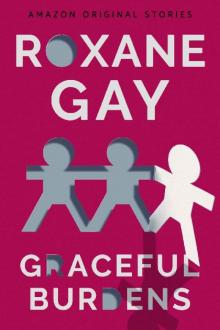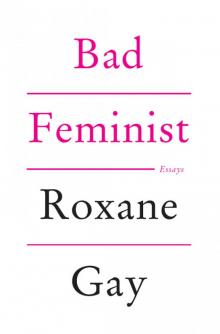- Home
- Roxane Gay
Bad Feminist: Essays Page 2
Bad Feminist: Essays Read online
Page 2
In graduate school I was the adviser of the black student association. There was a negligible black faculty presence on campus (you could count them on one hand), and those folks were either too busy or burnt out or completely uninterested in the job. After four years, I understood. The older I get, the more I understand lots of things. Advising a black student association is exhausting and thankless and heartbreaking. It kind of destroys your faith after a while. A new black faculty member came to campus a couple years in, and I asked why she didn’t work with the black students. She said, “That’s not my job.” That person said, “They’re unreachable.” I hate when people say something is not their job or that something isn’t possible. We all say these things, sure, but some people actually believe they don’t have to work beyond what is written in their job description or that they don’t have to try to reach those who seemingly cannot be reached.
I get my work ethic from my tireless father. When it comes to showing young black students there are teachers who look like them, when it comes to mentoring and being there to support students, I feel it’s everyone’s job (regardless of ethnicity), and if you don’t believe that as a black academic, you need to check yourself, immediately, and then check yourself again and keep checking yourself until you get your head on right.
When I was an adviser, the black students respected me, probably, but they didn’t really like me a lot of the time. I get it. I am an acquired taste. Mostly, they thought I was “bougie.” Many of them called me redbone and laughed when I got irritated. They thought the way I use slang is hilarious because I round my vowels. They’d tell me, “Say ‘holla’ again,” and I would because that’s one of my favorite words even if I maybe say it wrong according to the kids. I kind of singsong the word. They especially loved how I said “gangsta.” I didn’t mind the teasing. I minded how they thought I expected too much from them where the definition of “too much” was to have any expectations at all.
Yes, I was a demanding bitch, and at times I was probably unreasonable. I insisted on excellence. I get that from my mother. My expectations were things like requiring the officers to show up to the executive meetings, insisting officers and members show up to general meetings at least five minutes early because to be early is to be on time, insisting that if students agreed to perform a given task they follow through, insisting they do their homework, insisting they ask for help and get tutoring when they needed that kind of support, insisting they stop thinking a C or D is a good grade, insisting they take college seriously, insisting they stop seeing conspiracy theories everywhere, insisting that not every teacher who did something they didn’t like was being racist.
Many of those kids, I quickly realized, did not know how to read or be a student. When talking about social issues in academia and even in intellectual circles, we talk about privilege a lot and how we all have privilege and need to be aware of it. I have always known the ways in which I am privileged, but working with these students, most of them from inner-city Detroit, made me realize the extent of my privilege. Whenever someone tells me I don’t acknowledge my privilege, I really want him or her to shut the fuck up. You think I don’t know? I’m crystal clear on privilege. The notion that I should be fine with the status quo even if I am not wholly affected by the status quo is repulsive.
These kids didn’t know how to read so I got them dictionaries, and because they were too shy to discuss literacy in meetings, they would catch me walking across campus or in my office and whisper, “I need help reading.” It had never crossed my mind before that it was possible for a child to be educated in this country and make it to college unable to read at a college level. Shame on me, certainly, for being so ignorant about the galling disparities in how children are educated. Shame on me. I learned so much more in grad school out of the classroom than I ever did sitting around a table talking about theoretical concepts. I learned about how ignorant I am. I am still working to correct this.
One-on-one, the students and I got along much better. They were far more open. I had no idea what I was doing. How do you teach someone to read? I consulted Dr. Google regularly. I bought a book with some basic grammar exercises. Sometimes, we just read their homework word for word, and when they didn’t know a word, I made them write it down and look it up and write the definition down too because that’s how my mother taught me. I had a mother who was home every day after school and who sat with me day after day and year after year until I went away for high school, helping me with my homework, encouraging me, and certainly pushing me toward excellence. There were things in my life my mother was unable to see, but when it came to my education and making sure I was a good, well-mannered person, she was on point in every way.
At times, I resented the amount of schoolwork I had to do at home. My American classmates didn’t have to do any of the stuff I had to do. I didn’t understand why my mom, both of my parents really, was so hell-bent on making us use our minds. There was a lot of pressure in our household. A lot. I was a pretty stressed-out kid, and some of that pressure was self-induced and some of it wasn’t. I enjoyed being the best and making my parents proud. I enjoyed the sense of control I felt by being good at school when there were other parts of my life that were desperately out of control. I was expected to get straight As. Bringing home a grade less than an A was not an option so I didn’t. This is a typical child-of-immigrants story, not at all interesting. When I worked with those kids in graduate school, I understood why my parents showed us how we had to work three times harder than white kids to get half the consideration. They did not impart this reality with bitterness. They were protecting us.
At the end of our sessions, the students I worked with would generally say, “Don’t tell anyone I came to see you.” It wasn’t that they were embarrassed to get help, most of the time. They were embarrassed to be seen putting effort into their education, to be seen caring. Sometimes, they’d open up about their lives. Many of the kids I worked with did not have parents who would or could prepare their children for the world the way mine did. Many of them were eldest children, the first in their families to go to college. One boy was the eldest of nine. One girl was the eldest of seven. Another girl was the eldest of six. There were many absent fathers, incarcerated mothers and fathers and cousins and aunties and siblings. There was alcoholism and drug addiction and abuse. There were parents who resented that their children were in college and tried to sabotage them. There were students who were sending their student loan refund checks back home to support their families and spending the semester without textbooks, without enough money to eat, because the mouths back at home needed to be fed. There were certainly students with a great parent or parents, with families who were supportive, who knew nothing of poverty, who were well prepared for the college experience or well prepared to do what it took to get up to speed. Those students were the exception. I often think about the danger of a single story, as discussed by Chimamanda Adichie in her TED Talk, but sometimes, there actually is a single story and it tears my heart open.
By the end of my last year of school, with all the other things I was dealing with in my personal life, I was completely burnt out. I had nothing left to give. All too often, the students just did not give a damn and neither did I. I’m not proud of this, but I really was dealing with a lot. That’s what I tell myself. The students didn’t show up to the BSA meetings. They half-assed their participation in club events and didn’t promote events and dropped the ball, and I no longer had the energy to glare and yell and push and prod and make them want to do better. If after four years they had learned nothing, I had failed, and there was little I could do to rectify that. They were just being college students, of course, but it was frustrating. When the last semester ended, I was relieved. I would miss the students because they were, to be clear, a great joy—bright, funny, charming, kind of crazy, but good kids. I still needed a break, a very, very long break.
The woman who recruited me to grad school had worked with the
black students for about twenty years. When she retired, she was so burnt out she couldn’t even talk about them without being overwhelmed by her frustration with their unwillingness to change, the ways they had been wronged, their lack of faith that there was a different, better way, the administration’s piss-poor efforts to create change, all of it. I understood her burnout too. It took me a mere four years, but I got there. And yet. There was an end-of-the-year banquet where the students surprised me. They gave me a plaque and read a beautiful speech where they said I was the epitome of integrity and grace. They thanked me for recognizing they were talented and powerful beyond measure. They said I stood up for them even when they were wrong and that I was family, which did nicely explain our relationship—unconditional but complicated. They said lots of other gorgeously flattering things. They didn’t have to say any of it. I left grad school feeling like I had reached them. They certainly reached me, made me feel like I was a part of something even though it was my job to make them feel like part of something.
As a faculty member, I haven’t sought out the black student association yet because I’ve been trying to summon the energy. I feel guilty about how I’m dragging my feet. I feel this sense of responsibility. I feel weak and stupid.
I had a black student in my class during my first year who felt I was picking on him because he was black. I’m told this comes up often for black faculty. I wasn’t picking on this kid. For one, I don’t have that kind of time. Also, I expect excellence from all my students, without exception. He had a perfect GPA before and simply couldn’t believe he was not earning an A in my class. He was incredulous that I did not think he deserved a proverbial cookie for having been a good student before coming to my class. I was incredulous at his arrogance. I got the sense he wanted me to be impressed that he was “different,” that he was a good student, like I should just grade him on past performance instead of how he did in my class. He once told me, “I’m not like the other [N-words] on campus.” I told him he’d better check his attitude and his language. We had some very tense conversations, one of which was so tense my boss, unbeknownst to me, stood in the hallway just out of sight the entire time because he felt this kid might get rowdy. I thought the kid was going to get rowdy. It took me a whole semester to get a handle on this kid’s issue. I eventually realized he didn’t want to be seen as one of those students who come in and don’t know enough to get through or don’t care enough to get through. His way of doing that, of proving he was different, was to maintain his perfect GPA by any means necessary. That student graduated and I don’t know where he is now, but I hope he won’t spend his life negotiating respectability politics.
I work hard. I volunteer for things. I try to deliver when I say I will do something. I try to do my job well. I extend myself, then overextend myself. I work at work and I work at home. I study my teaching evaluations, trying to make sense of my imperfections so that next time, I might get it right. I sit with my colleagues and think, Please like me. Please like me. Please like me. Please respect me. At the very least, don’t hate me. People often misunderstand me, misunderstand my motivations. The pressure is constant and suffocating. I say I’m a workaholic and maybe I am, but maybe I’m just trying, like my student, to show how I’m different.
In graduate school, early on, I once overheard a classmate talking in her office as I walked by. She didn’t know I was there. She was gossiping about me to a group of our classmates and said I was the affirmative-action student. I went to my office, trying to hold it together until I was alone. I was not going to be the girl who cried in the hallway. As soon as I crossed the threshold, I started sobbing because that was my greatest fear, that I wasn’t good enough and that everyone knew it. Rationally, I know it was absurd, but hearing how she and maybe others saw me hurt real bad. There was no one I could really talk to about what I had heard because I was the only student of color in the program. There was no one else who would understand. Sure, I had friends, good friends who would commiserate, but they wouldn’t get it and I would never be able to trust that they didn’t feel the same way.
I stopped joking about being a slacker. I tripled the number of projects I was involved with. I was excellent most of the time. I fell short some of the time. I made sure I got good grades. I made sure my comprehensive exams were solid. I wrote conference proposals and had them accepted. I published. I designed an overly ambitious research project for my dissertation that kind of made me want to die. No matter what I did, I heard that girl, that girl who had accomplished a fraction of a fraction of what I had, telling a group of our peers I was the one who did not deserve to be in our program. Those peers, by the way, did not defend me. They did not disagree. That hurt too. Her words kept me up at night. I can still hear her, the clarity of her voice, the confidence of her conviction. At work, I constantly worry, Do they think I’m the affirmative-action hire? I worry, Do I deserve to be here? I worry, Am I doing enough? I have a PhD I damn well earned, and I worry I am not good enough. It’s insane, irrational, and exhausting. Frankly, it’s depressing.
I know none of this might make sense, but for me, it is all connected.
I am still writing my way toward a place where I fit, but I am also finding my people in unexpected places—California, Chicago, upper Michigan, other places, some not on any kind of map. Writing bridges many differences. Kindness bridges many differences too, and so does a love of One Tree Hill or Lost or beautiful books or terrible movies. There are times when I wish finding community was as simple as entering some personal information and letting an algorithm show me where I belong. And then I realize that in many ways, this is what the Internet and social networking has done for me—offered community.
Or perhaps I am not looking for an algorithm at all.
An algorithm is a procedure for solving a problem in a finite number of steps. An algorithm leads to a neat way of understanding a problem too complex for the human mind to solve.
That’s not what I am looking for. John Louis von Neumann said, “If people do not believe that mathematics is simple, it is only because they do not realize how complicated life is.” Mathematics may well be simple, but the complexities of race and culture are often irreducible. They cannot be wholly addressed in a single essay or book or television show or movie.
I will keep writing about these intersections as a writer and a teacher, as a black woman, as a bad feminist, until I no longer feel like what I want is impossible. I no longer want to believe these problems are too complex for us to make sense of them.
Peculiar Benefits
When I was young, my parents took our family to Haiti during the summers. For them, it was a homecoming. For my brothers and me it was an adventure, sometimes a chore, and always a necessary education on privilege and the grace of an American passport. Until visiting Haiti, I had no idea what poverty really was or the difference between relative and absolute poverty. To see poverty so plainly and pervasively left a profound mark on me.
To this day, I remember my first visit, and how at every intersection, men and women, shiny with sweat, would mob our car, their skinny arms stretched out, hoping for a few gourdes or American dollars. I saw the sprawling slums, the shanties housing entire families, the trash piled in the streets, and also the gorgeous beach and the young men in uniforms who brought us Coca-Cola in glass bottles and made us hats and boats out of palm fronds. It was hard for a child to begin to grasp the contrast of such inescapable poverty alongside almost repulsive luxury, and then the United States, a mere eight hundred miles away, with its gleaming cities rising out of the landscape and the well-maintained interstates stretching across the country, the running water and the electricity. It wasn’t until many, many years later that I realized my education on privilege began long before I could appreciate it in any meaningful way.
Privilege is a right or immunity granted as a peculiar benefit, advantage, or favor. There is racial privilege, gender (and identity) privilege, heterosexual privilege, economic privi
lege, able-bodied privilege, educational privilege, religious privilege, and the list goes on and on. At some point, you have to surrender to the kinds of privilege you hold. Nearly everyone, particularly in the developed world, has something someone else doesn’t, something someone else yearns for.
The problem is, cultural critics talk about privilege with such alarming frequency and in such empty ways, we have diluted the word’s meaning. When people wield the word “privilege,” it tends to fall on deaf ears because we hear that word so damn much it has become white noise.
One of the hardest things I’ve ever had to do is accept and acknowledge my privilege. It’s an ongoing project. I’m a woman, a person of color, and the child of immigrants, but I also grew up middle class and then upper middle class. My parents raised my siblings and me in a strict but loving environment. They were and are happily married, so I didn’t have to deal with divorce or crappy intramarital dynamics. I attended elite schools. My master’s and doctoral degrees were funded. I got a tenure-track position my first time out. My bills are paid. I have the time and resources for frivolity. I am reasonably well published. I have an agent and books to my name. My life has been far from perfect, but it’s somewhat embarrassing for me to accept just how much privilege I have.

 Graceful Burdens (Out of Line collection)
Graceful Burdens (Out of Line collection) The Best American Short Stories 2018
The Best American Short Stories 2018 Bad Feminist
Bad Feminist Bad Feminist: Essays
Bad Feminist: Essays Ayiti
Ayiti Difficult Women
Difficult Women An Untamed State
An Untamed State Hunger
Hunger